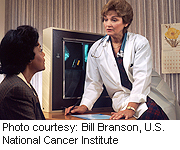
THURSDAY, July 19 (HealthDay News) — Lack of health insurance is a major predictor of whether women will be diagnosed with late-stage cervical cancer, a new study suggests.
The analysis of data from nearly 70,000 U.S. women diagnosed with invasive cervical cancer between 2000 and 2007 found that lack of insurance was second only to age as the strongest predictor of late-stage (stages 3 and 4) cancer at diagnosis.
The researchers found that 55 percent of privately insured patients had stage 1 cancer at diagnosis, compared with 40 percent of Medicaid recipients and 36 percent of uninsured patients.
In contrast, late-stage cancer was diagnosed in 24 percent of those with private insurance, 34 percent of those with Medicaid and 35 percent of those without insurance.
Age was another important factor. Women 35 and older were up to 2.5 times more likely to be diagnosed with advanced cancer than those aged 21 to 34.
Inadequate screening contributes to the risk of being diagnosed with late-stage cervical cancer, the researchers noted.
The study was published online July 19 in the American Journal of Public Health.
“Advanced-stage disease leads not only to poorer quality of life and greater morbidity, but often to higher treatment costs as well. Screening should be made accessible and affordable for all women for whom it is recommended, especially for those at higher risk of advanced-stage disease, such as middle-aged women, Medicaid recipients and uninsured women,” they concluded in a journal news release.
More than 12,000 women will be diagnosed with cervical cancer and more than 4,200 will die of the disease in the United States this year, according to the American Cancer Society.
More information
The U.S. National Cancer Institute has more about cervical cancer screening.

